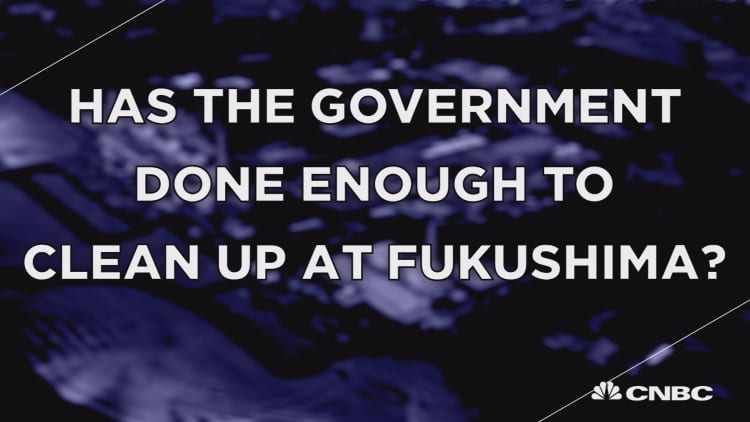Energy Secretary Rick Perry on Tuesday warned that the United States could suffer a nuclear disaster like Japan's Fukushima catastrophe if it does not find a solution for its nuclear waste.
The Trump administration believes that solution is a long-delayed plan to store all of the country's nuclear waste at a facility located deep inside Nevada's Yucca Mountain.
The White House has asked Congress for $120 million to restart the licensing process for the nuclear waste facility, which is meant to be a permanent home for atomic waste that is currently stored at nuclear facilities around the U.S.
In testimony to Congress, Perry raised concerns about the San Onofre Nuclear Generating Station, where Southern California Edison has for years stored spent nuclear fuel rods in cooling ponds, a common practice across the country.
The decommissioned station is located just yards from the Pacific Ocean and near one of America's busiest highways, in an area prone to earthquakes.
"Having those spent fuel rods in those cooling ponds in a region of the world that's inside that 'Ring of Fire,' as they call it — and the potential to have a geologic event — we could have a repeat of what happened at Fukushima to some degree," Perry told members of the House Committee on Appropriations.

In 2011, the Fukushima Daiichi nuclear plant on Japan's east coast suffered a meltdown after a tsunami knocked out generators, causing its cooling system to fail. During the incident, pools storing spent fuel rods also overheated.
The incident caused massive radioactive contamination that forced entire cities and towns to be abandoned. To be sure, a disaster on that scale at the California facility is unlikely because it no longer has functioning nuclear reactors.
Perry on Tuesday said lawmakers have a moral obligation to find a permanent solution for the country's nuclear waste. He backed a long-delayed plan to store the waste at Yucca Mountain, an option that former Senate Majority Leader Harry Reid, D.-Nev., managed to scuttle for many years.
The plan faces continued opposition from Nevada lawmakers and many environmentalists. However, it has support among many members of Congress eager to see nuclear waste shipped out of their states and stored at a secure, central facility.
During his confirmation hearing, Perry played to both sides of the issue.
Locations of nuclear waste for geologic disposal (2002), source: Department of Energy
On Tuesday, Perry also raised the prospect of temporarily storing nuclear waste from around the country at the Nevada National Security Site, a former testing ground for nuclear devices. He also mentioned sites in New Mexico and Texas that have previously been discussed as interim storage sites.
A bipartisan group of lawmakers has introduced legislation to authorize the Department of Energy to enter into contracts to store high-level radioactive waste and spent nuclear fuel at temporary facilities. Perry needs that authorization, as well as permission to tap funds, to establish the sites.
On Monday, Perry told CNBC that reviving the U.S. nuclear energy industry is "on the front burner" for the Trump administration.
Watch: Fukushima cleanup could take 40 years



